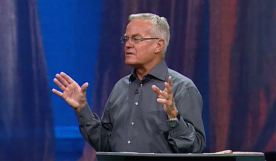
More than a third of American clergy are obese, according to a new study from Baylor University - but the profession also has some built-in prevention methods.
The figure for obesity correlates with the national statistics for the US, a third of whose adults are obese, and backs up previous studies. The equivalent figure in the UK is around 23 per cent.
The report published in the journal Social Science Research, "Occupational conditions, self-care and obesity among clergy in the United States", identifies particular factors such as stress, long hours, being underpaid and failing to take care of themselves as some of the reasons for pastors being overweight.
However, pastors do have advantages, if they are willing to use them.
Lead researcher Todd Ferguson said: "In many religious traditions, the theology actually mandates at least one day a week to recuperate. Also, some pastors have the opportunity to be part of a small, intensive, introspective group of other pastors, and that can help with stress. There are structures in place that can actually help them cope and lower their chances of obesity."
He said that pastors tended to be in situations where food was available: "Pastors are an integral part of the most intimate aspects of community life - marriages, deaths, births - and these often entail food. It's part of the culture."
However, the research shows that while clergy are in a relatively high-status occupation, many are compensated poorly compared to other professionals with similar education levels. They may have no other option than to be bi-vocational. The study showed that 10 per cent lead more than one congregation, while 15 per cent are employed in a second job of another type.
The stress of an additional job - coupled with the long hours and demands of pastoring - may make it difficult to have a lifestyle that includes nutritious foods, exercise and time to recover from physiological stress that leads to weight gain.
"Pastors are 'on' or 'on call' at all times. The role or identity of a pastor is something you can't just shut off," said Ferguson, a former associate pastor in a Houston Baptist church. "And you are in an organisation that relies partly - or even fully - on volunteers rather than a paid staff, who can leave on a whim."
The study also asked whether pastors had too many demands made on them by congregation members, experienced stress because of dealing with critical congregants, felt lonely and isolated in their work or worked more than 46 hours per week.
It showed that 20 per cent had taken a sabbatical in the past 10 years, while 43 per cent are involved in a support group that focuses on their personal concerns or struggles.















